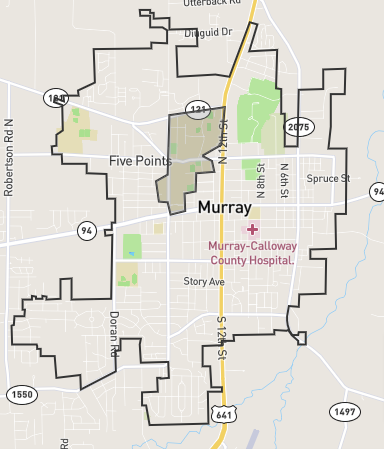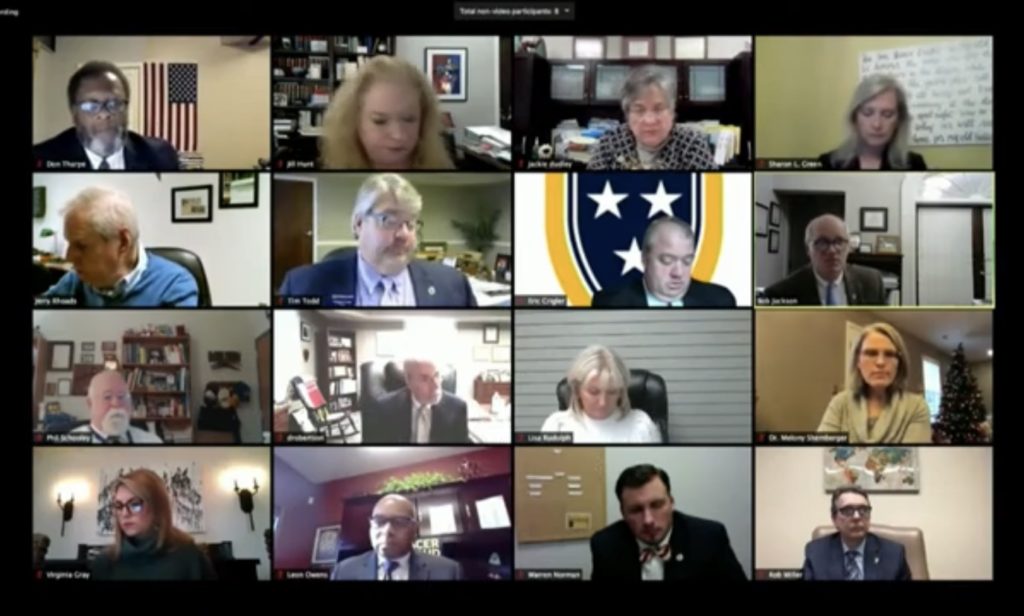
The Murray State Board of Regents’ committee charged with reviewing President Randy Dunn’s employment contract was met with scrutiny this week regarding intentions to hold a meeting in executive session.
The board created the ad-hoc contract review committee at the Dec. 14 quarterly meeting. Board Chairman Constantine Curris, Vice Chair Marilyn Buchanon and board member Stephen Williams comprise the three-person committee.
In unofficial minutes from that meeting, provided by the president’s office, the board passed a resolution including the committee’s intention to hold an executive session with the full board to discuss the presidential contract and issues surrounding it.
That resolution states that the meeting will be held during the scheduled March 15 Board of Regents meeting. Then, at the May 10 meeting, the ad-hoc committee will present its findings to the Regents.
This week, Dunn said he believes the meeting should not be held closed to the public because it violates an existing state legal opinion.
Assistant Attorney General James Herrick issued an opinion in 2012 that found the Martin County Board of Education (eastern Kentucky) in violation of the Kentucky Open Meetings Act because discussion of whether or not to renew the superintendent’s contract was improperly held in closed session.
Gary Ball, editor of The Martin County-Tug Valley Mountain Citizen, issued the complaint to the attorney general’s office, arguing that the contract extension discussion was not protected by KRS 61.810(1)(f). That state statute legalizes closed session meetings by government officials only when they concern appointment, discipline or dismissal. The attorney general’s office held that no damage could be done to either party by holding the meeting in open public session. The attorney general opinion explains the reasoning behind the existing KRS law and why the Martin County Board of Education’s decision does not apply.
The statute states that when several individuals have applied for a single position, all but one must be eliminated because they are less qualified. That provides the opportunity for reputational damage to one or more. But Herrick found that no potential reputational damage to either parties existed when only a single individual’s contract was under discussion.
“… such potential does not exist where the discussion concerns a mere attempt to secure the continued employment of an existing employee,” he stated. “Therefore, the board’s discussion of a new contract for the current superintendent did not relate to the ‘appointment’ of an employee.”
The finding goes on to state that even though there exists the potential for what could arguably be considered a dismissal, in that the contract would not be extended, a true dissolution of employment would only occur if the board terminated the contract for any reason.
Dunn said he believes that opinion can be applied to the board’s voted intention to allow the contract review committee to meet in closed session – away from the public eyes and ears.
“(The board’s resolution) indicated (the ad-hoc contract review committee) was for the purpose of determining – as implied by the name – whether or not to extend the contract,” Dunn said Tuesday. “As I see the attorney general’s opinion, I don’t see a lot of wiggle room in the fact that extension of a contract is a topic that has explicitly been stated should be done in open session.”
He said he believed it would only be legal for the committee and board to meet for the purpose of reopening a presidential evaluation. The University president undergoes annual checklist evaluations, and every four years, the board conducts a comprehensive, 360-degree performance assessment. The board finalized the results of its evaluation of the president almost exactly a year ago, and Dunn said he had had the narrative conclusions for more than 10 months.
Curris spoke to The News via email Wednesday. He said he was not in a position to discuss legal issues.
“… I am not an attorney and do not comment on legal issues,” the email states. He directed further questions to Jill Hunt, the president’s executive coordinator and board secretary. Curris told WKMS, Murray State’s NPR affiliate, that the committee-board meeting was still planned to be held in closed session.
Repeated attempts to contact University Counsel John Rall were unsuccessful.
Dunn’s existing contract is set to expire on June 30, 2014 – about three years and nine months since the board’s last presidential contract negotiations in 2010. According to Curris, and as indicated in the unofficial minutes, the terms of the contract outline a resolution to finalize a decision on whether or not to renew Dunn’s contract by June 30 of this year.
Neither the contents of Dunn’s contract, also obtained from the president’s office, nor any existing board policy, however, prohibit a contract decision prior to that date. Dunn said he had hoped the Regents would have entertained the possibility of an early contract extension in March when the comprehensive evaluation report was given to him.
He said he understands if the board intended to see if he had implemented the suggestions outlined in that document. A year later, though, the timeline for renewing his contract ebbs ever nearer.
Much of this discussion would not take place had it not been for the negotiations that took place in 2010 surrounding the pure evergreen clause in Dunn’s first contract in 2005.
That clause stipulated that as long as the board made no action to end Dunn’s contract, it would be renewed – essentially, there was no need for a “yes” vote. But during the latest contract negotiations, Dunn said the board showed interest in removing the clause, and he traded the removal of that clause for additional vacation days. He said he had no reservations about the board’s wish to remove the clause at the time.
“I thought it was a fair trade,” he said. “It’s not like I’m crying about it now, because I knew what I was getting in to. Had I known it would play out quite this way, I may have rethought it.”
In October, Dunn was named one of two finalists for the position of Missouri State University president. Then, only days before the Dec. 14 board meeting late last year, Dunn was interviewed by the Florida State Board of Education for the vacant commissioner of education spot.
Dunn has said he and his wife Ronda wish to remain at Murray State, but he has no choice but to make preparations for employment elsewhere should the board fail to renew his contract.
Story by Austin Ramsey, Editor-in-Chief

































































































